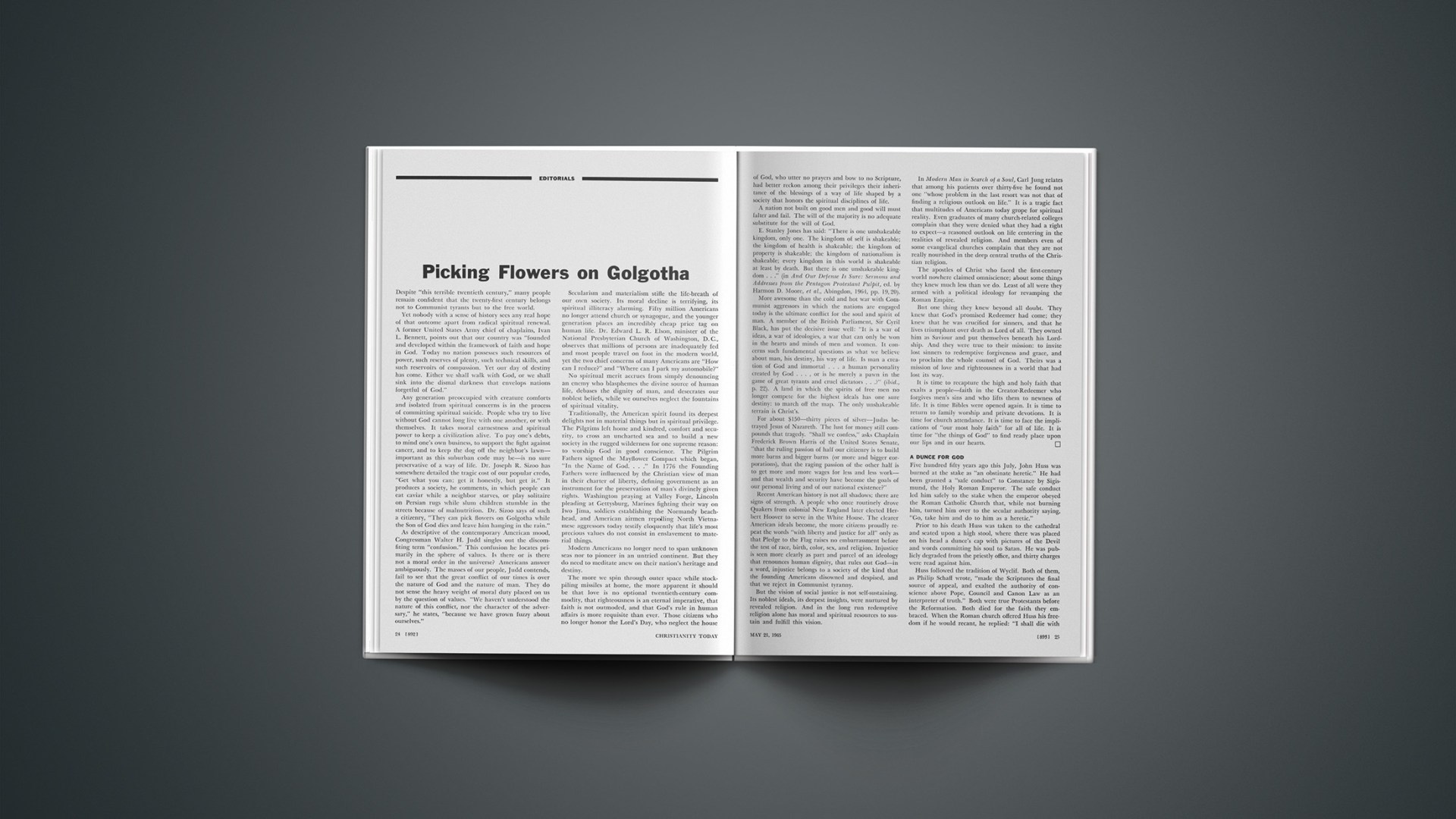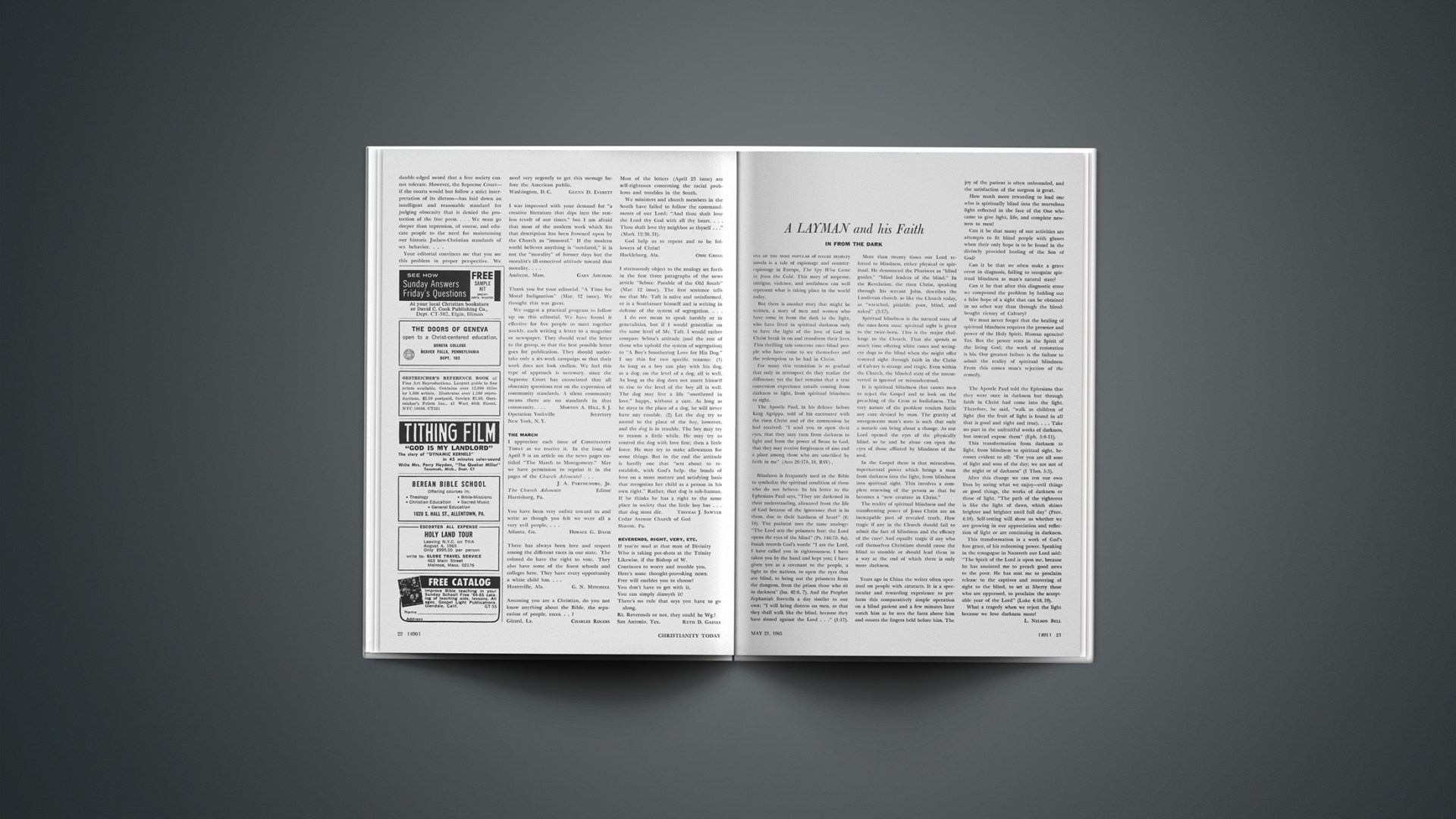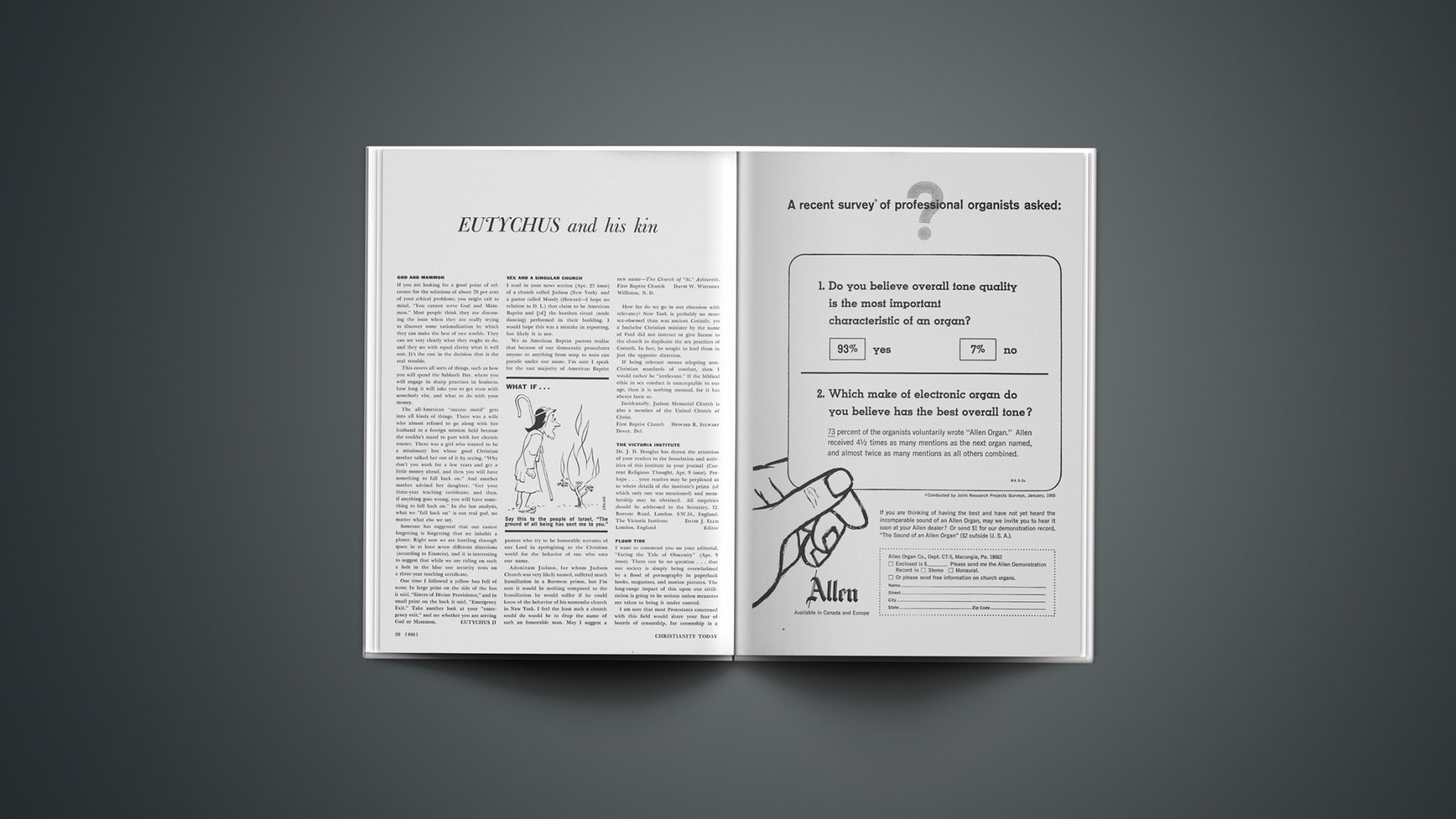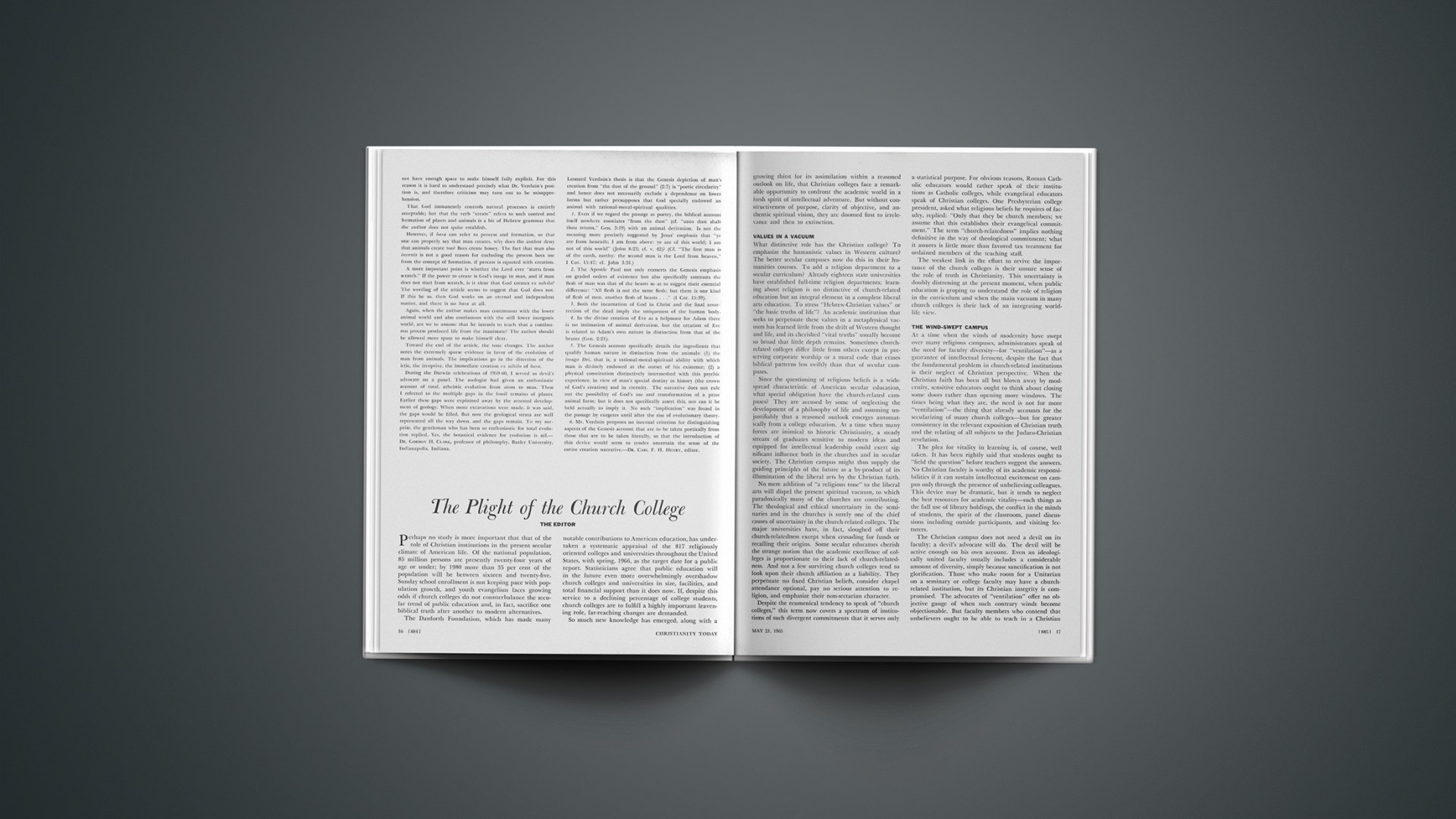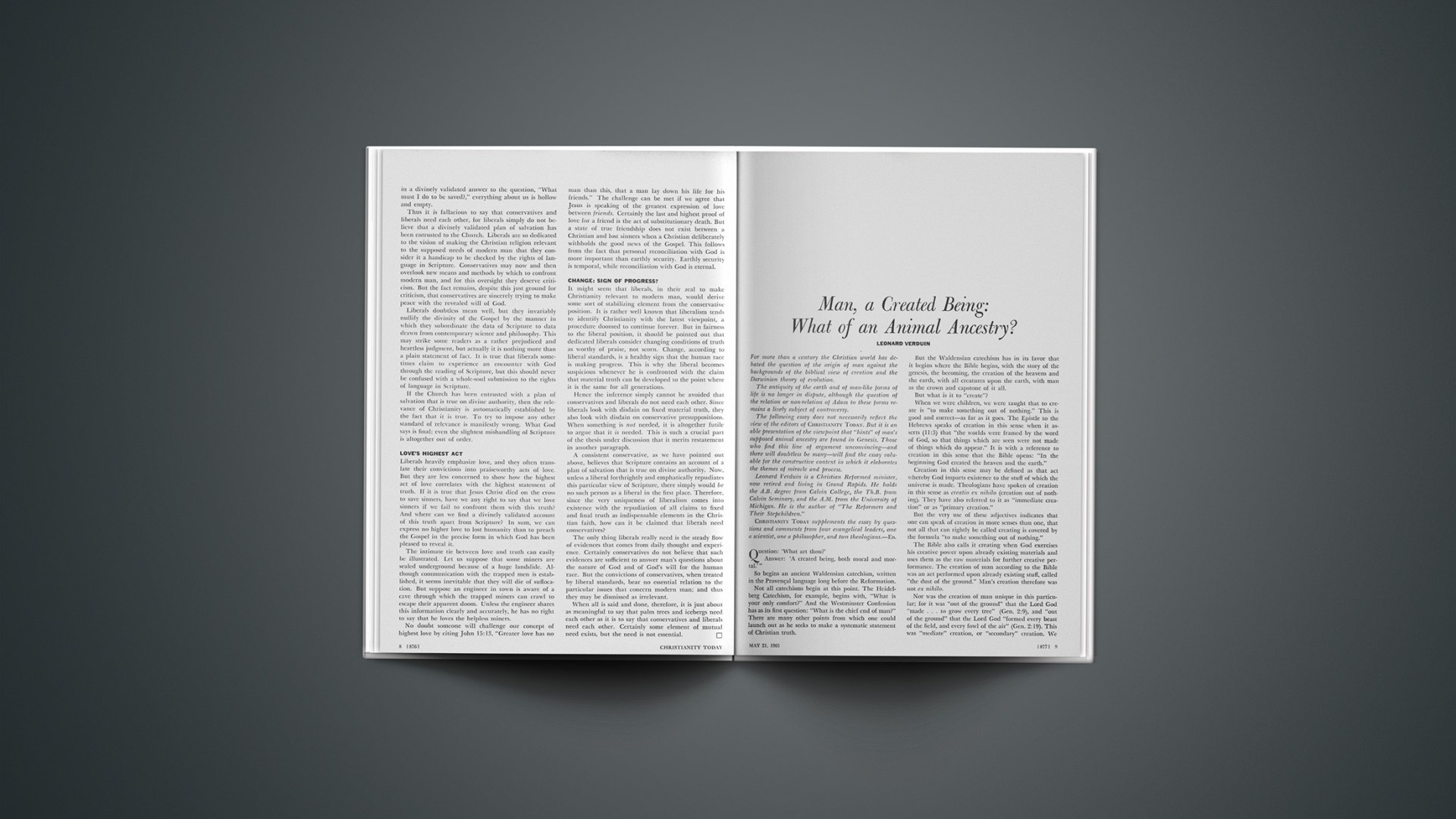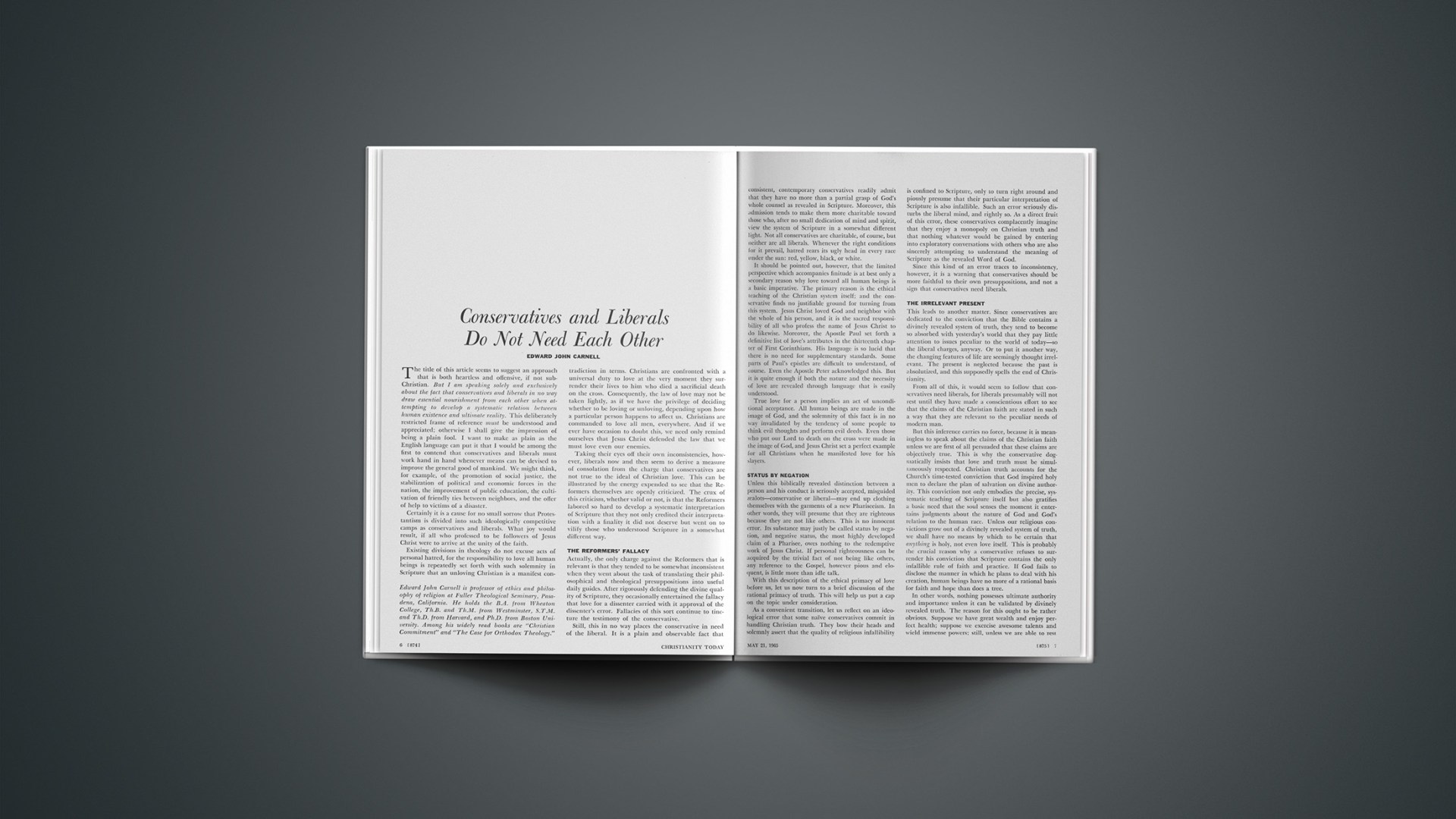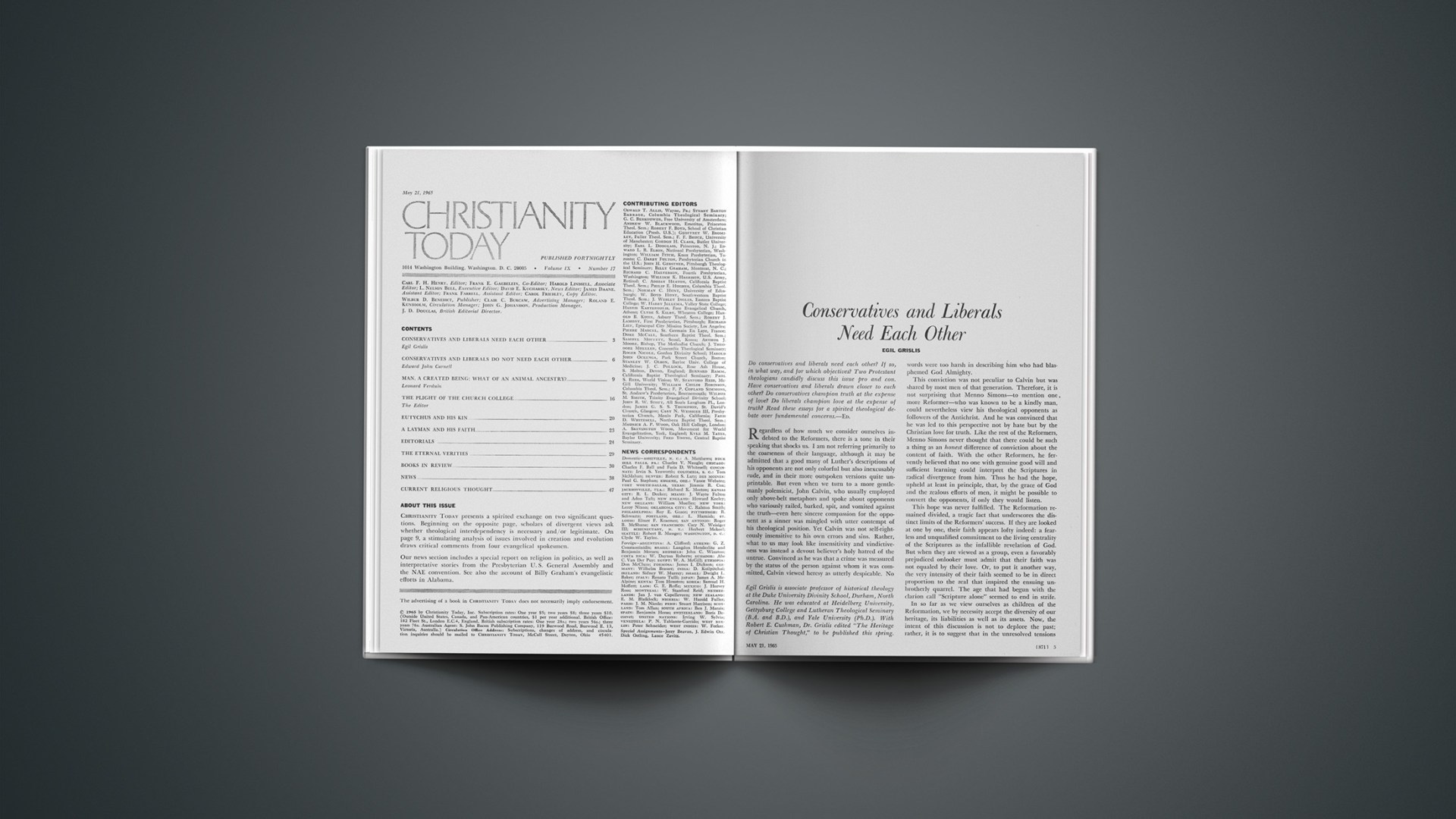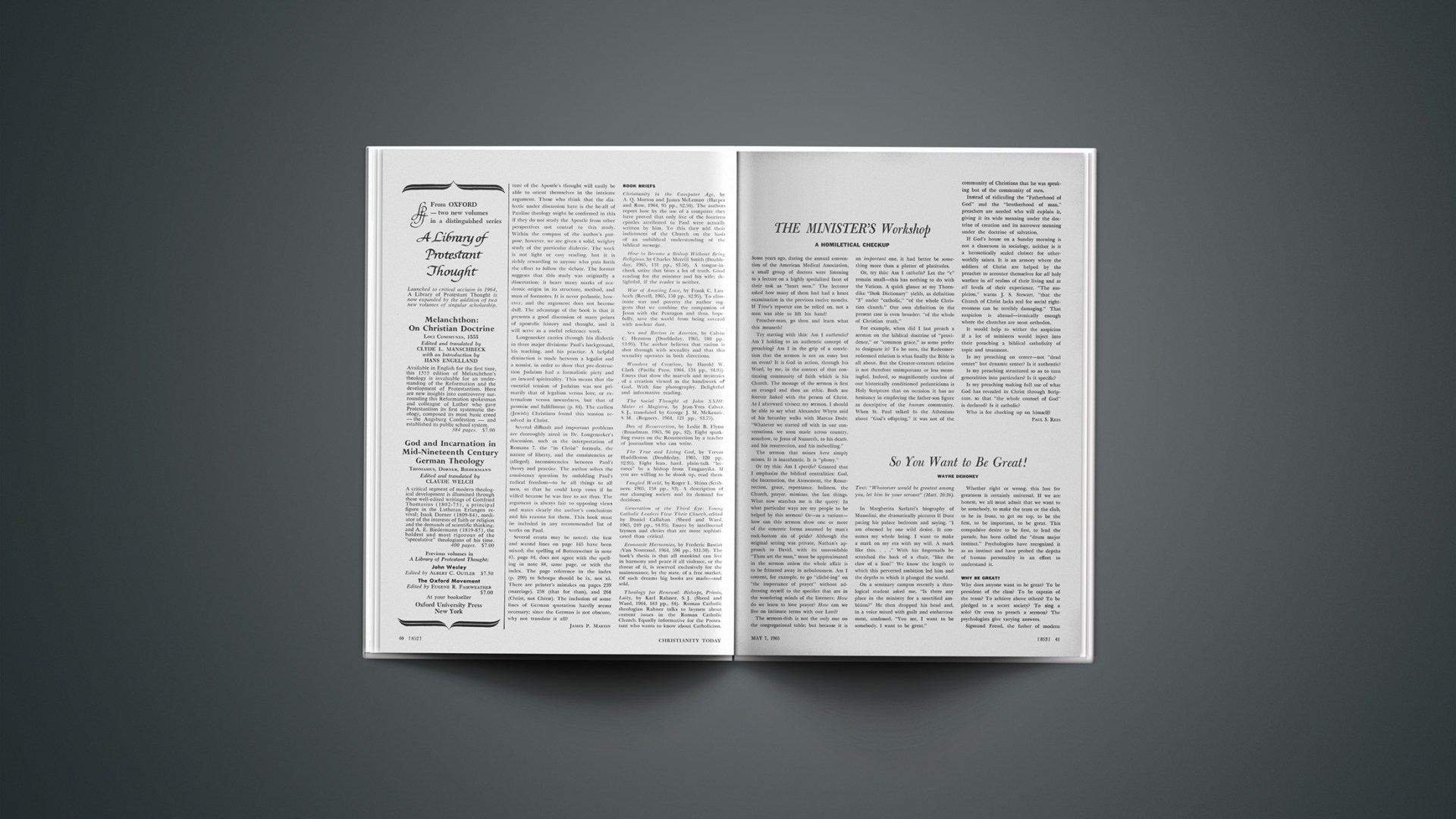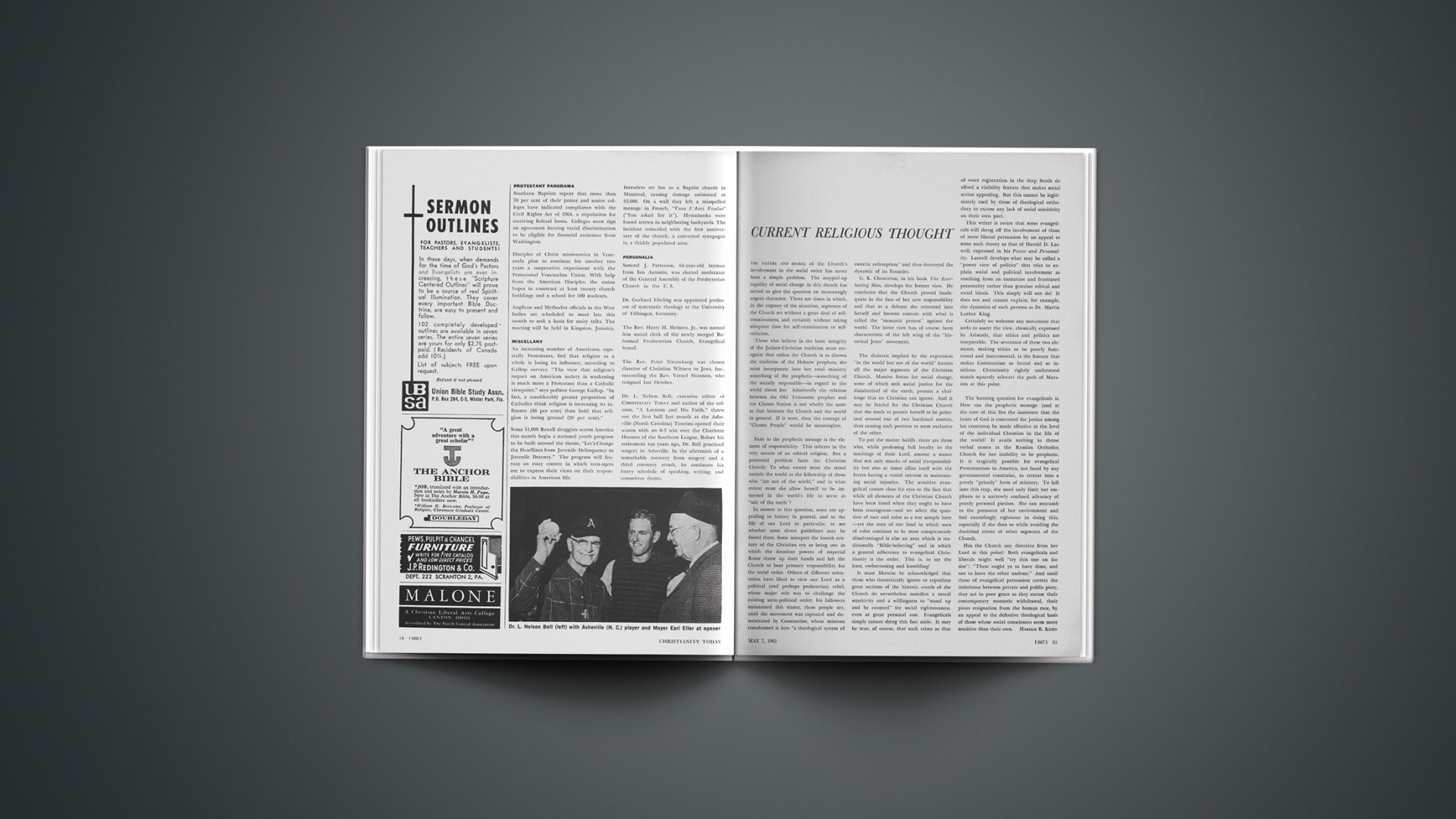Despite “this terrible twentieth century,” many people remain confident that the twenty-first century belongs not to Communist tyrants but to the free world.
Yet nobody with a sense of history sees any real hope of that outcome apart from radical spiritual renewal. A former United States Army chief of chaplains, Ivan L. Bennett, points out that our country was “founded and developed within the framework of faith and hope in God. Today no nation possesses such resources of power, such reserves of plenty, such technical skills, and such reservoirs of compassion. Yet our day of destiny has come. Either we shall walk with God, or we shall sink into the dismal darkness that envelops nations forgetful of God.”
Any generation preoccupied with creature comforts and isolated from spiritual concerns is in the process of committing spiritual suicide. People who try to live without God cannot long live with one another, or with themselves. It takes moral earnestness and spiritual power to keep a civilization alive. To pay one’s debts, to mind one’s own business, to support the fight against cancer, and to keep the dog off the neighbor’s lawn—important as this suburban code may be—is no sure preservative of a way of life. Dr. Joseph R. Sizoo has somewhere detailed the tragic cost of our popular credo, “Get what you can; get it honestly, but get it.” It produces a society, he comments, in which people can eat caviar while a neighbor starves, or play solitaire on Persian rugs while slum children stumble in the streets because of malnutrition. Dr. Sizoo says of such a citizenry, “They can pick flowers on Golgotha while the Son of God dies and leave him hanging in the rain.”
As descriptive of the contemporary American mood, Congressman Walter H. Judd singles out the discomfiting term “confusion.” This confusion he locates primarily in the sphere of values. Is there or is there not a moral order in the universe? Americans answer ambiguously. The masses of our people, Judd contends, fail to see that the great conflict of our times is over the nature of God and the nature of man. They do not sense the heavy weight of moral duty placed on us by the question of values. “We haven’t understood the nature of this conflict, nor the character of the adversary,” he states, “because we have grown fuzzy about ourselves.”
Secularism and materialism stifle the life-breath of our own society. Its moral decline is terrifying, its spiritual illiteracy alarming. Fifty million Americans no longer attend church or synagogue, and the younger generation places an incredibly cheap price tag on human life. Dr. Edward L. R. Elson, minister of the National Presbyterian Church of Washington, D.C., observes that millions of persons are inadequately fed and most people travel on foot in the modern world, yet the two chief concerns of many Americans are “How can I reduce?” and “Where can I park my automobile?”
No spiritual merit accrues from simply denouncing an enemy who blasphemes the divine source of human life, debases the dignity of man, and desecrates our noblest beliefs, while we ourselves neglect the fountains of spiritual vitality.
Traditionally, the American spirit found its deepest delights not in material things but in spiritual privilege. The Pilgrims left home and kindred, comfort and security, to cross an uncharted sea and to build a new society in the rugged wilderness for one supreme reason: to worship God in good conscience. The Pilgrim Fathers signed the Mayflower Compact which began, “In the Name of God.…” In 1776 the Founding Fathers were influenced by the Christian view of man in their charter of liberty, defining government as an instrument for the preservation of man’s divinely given rights. Washington praying at Valley Forge, Lincoln pleading at Gettysburg, Marines fighting their way on Iwo Jima, soldiers establishing the Normandy beachhead, and American airmen repelling North Vietnamese aggressors today testify eloquently that life’s most precious values do not consist in enslavement to material things.
Modern Americans no longer need to span unknown seas nor to pioneer in an untried continent. But they do need to meditate anew on their nation’s heritage and destiny.
The more we spin through outer space while stockpiling missiles at home, the more apparent it should be that love is no optional twentieth-century commodity, that righteousness is an eternal imperative, that faith is not outmoded, and that God’s rule in human affairs is more requisite than ever. Those citizens who no longer honor the Lord’s Day, who neglect the house of God, who utter no prayers and bow to no Scripture, had better reckon among their privileges their inheritance of the blessings of a way of life shaped by a society that honors the spiritual disciplines of life.
A nation not built on good men and good will must falter and fail. The will of the majority is no adequate substitute for the will of God.
E. Stanley Jones has said: “There is one unshakeable kingdom, only one. The kingdom of self is shakeable; the kingdom of health is shakeable; the kingdom of property is shakeable; the kingdom of nationalism is shakeable; every kingdom in this world is shakeable at least by death. But there is one unshakeable kingdom …” (in And Our Defense Is Sure: Sermons and Addresses from the Pentagon Protestant Pulpit, ed. by Harmon D. Moore, et al., Abingdon, 1964, pp. 19, 20).
More awesome than the cold and hot war with Communist aggressors in which the nations are engaged today is the ultimate conflict for the soul and spirit of man. A member of the British Parliament, Sir Cyril Black, has put the decisive issue well: “It is a war of ideas, a war of ideologies, a war that can only be won in the hearts and minds of men and women. It concerns such fundamental questions as what we believe about man, his destiny, his way of life. Is man a creation of God and immortal … a human personality created by God …, or is he merely a pawn in the game of great tyrants and cruel dictators …?” (ibid., p. 22). A land in which the spirits of free men no longer compete for the highest ideals has one sure destiny: to march off the map. The only unshakeable terrain is Christ’s.
For about $150—thirty pieces of silver—Judas betrayed Jesus of Nazareth. The lust for money still compounds that tragedy. “Shall we confess,” asks Chaplain Frederick Brown Harris of the United States Senate, “that the ruling passion of half our citizenry is to build more barns and bigger barns (or more and bigger corporations), that the raging passion of the other half is to get more and more wages for less and less work—and that wealth and security have become the goals of our personal living and of our national existence?”
Recent American history is not all shadows; there are signs of strength. A people who once routinely drove Quakers from colonial New England later elected Herbert Hoover to serve in the White House. The clearer American ideals become, the more citizens proudly repeat the words “with liberty and justice for all” only as that Pledge to the Flag raises no embarrassment before the test of race, birth, color, sex, and religion. Injustice is seen more clearly as part and parcel of an ideology that renounces human dignity, that rules out God—in a word, injustice belongs to a society of the kind that the founding Americans disowned and despised, and that we reject in Communist tyranny.
But the vision of social justice is not self-sustaining. Its noblest ideals, its deepest insights, were nurtured by revealed religion. And in the long run redemptive religion alone has moral and spiritual resources to sustain and fulfill this vision.
In Modern Man in Search of a Soul, Carl Jung relates that among his patients over thirty-five he found not one “whose problem in the last resort was not that of finding a religious outlook on life.” It is a tragic fact that multitudes of Americans today grope for spiritual reality. Even graduates of many church-related colleges complain that they were denied what they had a right to expect—a reasoned outlook on life centering in the realities of revealed religion. And members even of some evangelical churches complain that they are not really nourished in the deep central truths of the Christian religion.
The apostles of Christ who faced the first-century world nowhere claimed omniscience; about some things they knew much less than we do. Least of all were they armed with a political ideology for revamping the Roman Empire.
But one thing they knew beyond all doubt. They knew that God’s promised Redeemer had come; they knew that he was crucified for sinners, and that he lives triumphant over death as Lord of all. They owned him as Saviour and put themselves beneath his Lordship. And they were true to their mission: to invite lost sinners to redemptive forgiveness and grace, and to proclaim the whole counsel of God. Theirs was a mission of love and righteousness in a world that had lost its way.
It is time to recapture the high and holy faith that exalts a people—faith in the Creator-Redeemer who forgives men’s sins and who lifts them to newness of life. It is time Bibles were opened again. It is time to return to family worship and private devotions. It is time for church attendance. It is time to face the implications of “our most holy faith” for all of life. It is time for “the things of God” to find ready place upon our lips and in our hearts.
A Dunce For God
Five hundred fifty years ago this July, John Huss was burned at the stake as “an obstinate heretic.” He had been granted a “safe conduct” to Constance by Sigismund, the Holy Roman Emperor. The safe conduct led him safely to the stake when the emperor obeyed the Roman Catholic Church that, while not burning him, turned him over to the secular authority saying, “Go, take him and do to him as a heretic.”
Prior to his death Huss was taken to the cathedral and seated upon a high stool, where there was placed on his head a dunce’s cap with pictures of the Devil and words committing his soul to Satan. He was publicly degraded from the priestly office, and thirty charges were read against him.
Huss followed the tradition of Wyclif. Both of them, as Philip Schaff wrote, “made the Scriptures the final source of appeal, and exalted the authority of conscience above Pope, Council and Canon Law as an interpreter of truth.” Both were true Protestants before the Reformation. Both died for the faith they embraced. When the Roman church offered Huss his freedom if he would recant, he replied: “I shall die with joy today in the faith of the Gospel I have preached.” As the flames swallowed his body, he was heard to sing twice: “Christ, thou Son of the living God, have mercy upon me.”
For five and a half centuries men have waited for the Roman church to right the wrong committed against John Huss. After the awful Salem witch trials in New England, the Massachusetts court made a full confession of its errors. In Geneva, Switzerland, in 1903, French Protestants erected a monument signifying their repentance for the burning of Servetus and for the part Calvin had in that tragic incident. But no pope or council has ever recanted for what the church did to Huss.
In any ecumenical dialogue, it would be well to place the name of John Huss high on the agenda for discussion. His views are no less important today than when he was burned at the stake. Is the Scripture the only final authority? Is conscience above pope, councils, canon law, and Protestant general assemblies, conventions, and consistories? Huss is dead, but the issues for which he died live on. His memory is imperishable; his faith and fervor are an everlasting testament to truth and to Christ.
A Time To Speak
Student demonstrations in foreign countries have long been signs of political unrest, noisy indications that political crises are in the making. This has been particularly true in revolutionary countries where governments rise and fall in quick succession. Even though students are often too young to vote, uneasy heads of state keep an alert eye on political fermentations and protests occurring on college and university campuses.
In the more stable climate of American social and political life, the college student has often been a rebel without a cause. But search for a cause he did, and he usually found one, on the campus itself. He would then, with a deep sense of achievement, deliver a protest telling the university’s president how the university should be run. Recently, however, college students have become increasingly concerned with off-campus social and political issues. This is a healthy sign and bespeaks better things than panty-raids and telephone-booth stuffing. Yet recent student political protests suggest that students are teaching the government before they have learned their lessons in civics and political history.
Not long ago ten to fifteen thousand students left campus and books behind to tell President Johnson what to do about Viet Nam. One wonders how undergraduates get so smart so soon. The French, not unlearned after centuries of practicing international diplomacy, struggled with Viet Nam for eight years and ended up without the right answer. The Johnson administration is funneling its best brains into the search for a solution. What special fount of wisdom did these thousands of college students tap that made them so confident of having the right answer that they traveled to Washington to enlighten the President and his advisers?
It has again been proved that a little knowledge is a dangerous thing. Although these students were shouting from the hip and not from the head, President Johnson was enough affected by their demonstration to take steps to enlighten his young advisers. He is returning the call by sending to college campuses persons who have been instructed to convey a full picture of all the issues involved in Viet Nam. This is a good thing. For the best protest comes from the person who knows what he is talking about.
Democracies depend on informed people who are capable of cool and sane judgment and immune to reckless mob spirit. Abraham Lincoln, whose campus was only a hearth, was sufficiently enlightened to remark that “there is no grievance that is a fit object of redress by mob law.” As a government of, and by, and for the people, a democracy depends on the sober restraint of its people and on their recognition that not everybody knows everything.
There are signs today that this restraint is crumbling. Everybody seems to be getting into the oracle act. Clergymen tell the government what to do about military, economic, and technological matters, although there are few things they know less about. Students follow suit; before they have finished their courses in history they are informing the government how it ought to chart its course through the complex sea of international affairs. There is a time to speak, and a time to study—and the last should come first.
The Church should learn from current student demonstrations that students are anxious to get caught up in crusades; that they want and need the satisfaction of doing something for a cause that is bigger than they are. Students are people. No less than others, they find life useless and meaningless if it presents them with nothing worth suffering for.
The magnificent service rendered recently by students in fighting back the flood waters of the Mississippi at many points of danger suggests that most of them do not conform to the student image that some press reports and the beatnik slice of the student body have created. We salute the students on the banks of the Mississippi River who literally turned the tide. And we summon society and especially the Christian Church to challenge students to identify with good causes in which they will find good reasons for living. Most students are not cynical about causes. But many are cynical in an affluent society about the worth of living only for more material goods.
An Example Of Excellence
During the past eight years, students in the English department at Wheaton (Illinois) College have achieved outstanding success in the Atlantic Monthly contest for creative writing. In competition with writers from colleges and universities throughout the nation, Wheaton writers have since 1958 been close to the top and for three of these years had the best record in the United States.
This year a historic “first” was scored by Jeanne Murray, a Wheaton College junior, who took top honors in both the poetry and short story divisions. Some of her fellow students were also given awards, with the result that 20 per cent of the recognized manuscripts in the 1965 Atlantic Monthly competition were written by Wheaton-trained writers.
CHRISTIANITY TODAY has consistently advocated excellence in evangelical education. Therefore we salute the award-winning students and the Wheaton English faculty. They are setting a standard that reflects credit upon evangelical Christian education. The achievement of excellence in writing or in any other part of education rests upon the kind of teaching that builds in students respect for truth and willingness to persist until clarity of thought and statement are attained. Without these, there can be no authentic scholarship and no honest creative expression.
Labor Laws And The Right Of Conscience
The majority of American Christians are not against labor unions. However, there are thousands of Christian people in the United States in such groups as Mennonites, Amish, Seventh-day Adventists, Christian Reformed, Protestant Reformed, and Plymouth Brethren who have conscientious objections to holding membership in labor unions. Their reasons are not always the same. Some object to affiliation in an organization that is religiously neutral. Some object to the use of force in strikes. They think it unchristian to achieve their rights by coercive measures. Still others feel that, since they are members of Christ, they may not become members of a labor, professional, trade, or any other kind of organization to which non-Christians also belong.
These moral arguments are neither dodges nor cheap attempts to reap the advantages of organized labor without accepting responsibility or paying membership dues. Many are willing to pay their share of labor bargaining costs; others would donate the equivalent of membership fees and dues to a charitable organization. Within the Christian Reformed churches, a Christian labor union has been organized, known as the Christian Labor Association. Such attitudes and actions bespeak the moral earnestness that attends the question of membership in labor unions.
But if these people differ in their reasons for refusing to hold membership in our national labor unions, all the reasons do fall into the basic category of the right and duty of a man not to act contrary to his conscience. The American government has long been very sensitive to the right of its citizens to live in terms of their consciences. It has not forced the conscientious objector to take up arms, nor has it forced the Jehovah’s Witness to salute the flag. This respect for the individual’s moral convictions is one of the profound ways in which American democracy differs from totalitarianism; totalitarian governments demand the ultimate loyalty of their citizens, whereas American democratic government recognizes that a man’s ultimate loyalty is to God, not the state.
In the nineteen states that have a right-to-work law, the person with moral objections to union affiliation is protected. In others he is not. Among the score of bills relating to the Taft-Hartley Act introduced in Congress, H.R. 4350 is prominent. This bill, while containing certain political safeguards, would, like H.R. 77, modify the Taft-Hartley Act to make state right-to-work laws illegal and thus compel any man to join a union in a union shop as a condition of obtaining or keeping a job. If such legislation is enacted, those in all fifty states who have conscientious objections to joining labor unions will be caught in the dilemma of violating their consciences or losing their jobs.
H.R. 4350 also requests Congress to designate the proposed change as the “Employee Civil Rights Act of 1965.” The attempt to confuse and mislead the public is glaringly obvious. To link the proposed change in the Taft-Hartley Act with the Negro civil rights issue and thus to convey the impression that the right of a union to force membership upon a conscientious objector is similar to the Negro’s right to vote is at best misleading, at worst dishonest. It is also anything but precise legal language. The employee’s “civil right” in this proposal is, for the Christian with moral objections, quite simply: John the union or lose your job. Such a choice savors of a Russian election, not an authentic American option.
Suppose the Church were to confront union members with the choice, “Join a church or lose your job.” How many of them would consider their compelled choice an exercise in civil rights?
Every American has a large stake in this issue. Not only the conscientious objector but also every lover of freedom should be concerned about this bold attempt to undermine the long American tradition that recognizes a man’s right to live by his conscience without sacrificing his right to work for a living.
Christian Missions And Turkey
One of the best friends America has had throughout the cold war period is Turkey. En route to the Holy Land, Americans on pilgrimage have often returned a report that nowhere were they greeted in such friendly fashion as in Turkey.
In response to Turkish friendship, Christian Americans would like to give the greatest thing in their power to give—the good news of Jesus Christ. But Turkish restrictions have made heavy going for the Christian missionary task. Dramatizing this fact was the scream of a front-page headline in the Turkish Ankara daily Ulus of April 28: “Network engaged in missionary work caught.” The report went on to name four men, Swiss, American, British, and Turkish, who had been engaged in Christian propaganda among university students in Ankara. Acting on a tipoff, security officers raided an apartment rented by the three foreigners, and found them around a table with five Turkish students, busy translating the New Testament. In the apartment were found about 8,000 envelopes and “propaganda brochures,” copies of which the police alleged had been mailed to many people during the feast of sacrifice (i.e. the Muslim lamb-killing feast in April). It was stated that investigation showed that “the network is run from headquarters located in Istanbul … controlled by an American navy man, Captain Luke, and the search has been intensified at that end.” The newspaper report claimed that the accused men were associates of Dale Rhoton (an American now working with Operation Mobilization in Beirut, Lebanon), who had previously been “expelled from Turkey for the same offense.” The case is now in the hands of the public prosecutor.
The report is misleading and yet faithfully reflects the confusion and illogicality of Turkish officialdom toward Christianity. The Ulus story is so presented that translation work is implied to be criminal; yet such work is done by the British and Foreign Bible Society, which functions legally in Turkey. The somewhat sinister reference to a senior American naval officer’s involvement does not tally with the facts: the person concerned turns out to be a civilian carpenter working for the United States Navy. Dale Rhoton, whose activities had come to the attention of the police, had not, however, been tried, sentenced, or expelled.
In 1962, three university professors who were appointed by the prosecuting attorney’s office to examine Operation Mobilization literature unanimously agreed that the literature contained nothing “contrary to our principles of Laicisim” (i.e. separation of state and religion). It regarded as irrelevant the suggestion that these principles were infringed because an allusion to the Second Coming of Christ had “the aim of altering the world system.”
Before Christ’s Second Advent does indeed alter the world system, our hope and prayer for our good friend Turkey is that she may hear his Gospel. In the past politico-religious circumstances altered this land where lie Tarsus, Antioch, Ephesus, Smyrna, and Contantinople. Now Mecca is preeminently in view rather than the New Jerusalem. But even as Turks are permitted to bring Islam to American shores, we covet for Turkey the free entry of the Christian Gospel.
The Dominican Crisis
American troops are in the Dominican Republic to protect the lives and property of Americans and others. When what seemed a simple internal revolution shaped up as a Communist-planned effort to take over a country of strategic importance to Latin America and the Panama Canal, President Johnson expanded American participation and sought the support of the Organization of American States in a mutual effort to preserve the integrity and freedom of this nation. As usual, there have been catcalls and plaudits. Russian and Cuban leaders, with predictable anguish, opposed this “imperialistic” assault against “a peoples’ movement.” The matter has been brought before the United Nations, where Adlai Stevenson has undertaken an explanation of the United States’ intervention in the affairs of another nation. The OAS has agreed to assume responsibility for the military operations.
Few people are aware of the background of the struggle. The Dominican Republic is slightly smaller than West Virginia and has a population of 3⅓ million. For years it was ruled by dictators, the latest of whom was Trujillo. He was replaced by Juan Bosch, who was elected president on December 20, 1962, in the first free election in thirty-eight years. Bosch’s regime was overthrown on September 25, 1963, and replaced by a triumvirate that promised another election on September 1, 1965.
This republic is one hour away by jet from Miami, Florida, and twenty minutes from Cuba. The Communists have infiltrated it, and the recent uprising is in accord with their plans to control this nation. For some time Castro’s agents have been interfering in the affairs of the Dominican Republic. Their violent reaction to America’s involvement accepts as honorable their own subversion and intervention.
One of the unalterable facts of life in the international arena is expressed in the phrase, “spheres of influence.” Since the days when the Monroe Doctrine was first elaborated, the United States has regarded the domination of any Latin American nation by foreign powers to be inimical to America’s national interest. President Johnson understands very well that the Dominican Republic falls within America’s sphere of influence. What happens there is of the greatest significance to the United States and to the free world.
Those of us who argue against situational ethics when absolutes are involved do recognize that in this instance the Word of God offers no absolutes to support one course of action over against another, as though one were right and the other wrong. Undoubtedly Mr. Johnson did not wish to send in our soldiers and was hesitant to do so. But he obviously thought that this action was far preferable to sitting still and doing nothing. The lesser of two evils was to take prompt and decisive military action. At this writing a formal ceasefire agreement, under the auspices of the OAS, has been signed by both sides in the civil war. The United States government has named a number of “Communist and Castroist” leaders who played an important role in the uprising, infiltrated the rebel leadership, organized the mobs, and carried out paramilitary action.
There are those who will argue that Mr. Johnson made a wrong decision. But Americans predictably will stand solidly behind the decision, and history will vindicate its rightness. Interestingly enough, even the veteran commentator Walter Lippmann, no consistent champion of administration policies, concluded that the President followed the only reasonable course of action.
It is too early to say how the situation will end. But we know there can be no “return to normalcy” in the Dominican Republic, because that would be a return to dictatorship similar to what the people endured under Trujillo. We can only hope that a new leadership will arise to carry this people to a way of life that will exclude dictatorship as well as Communism and bring a stable government under which the people can enjoy liberty and justice.

